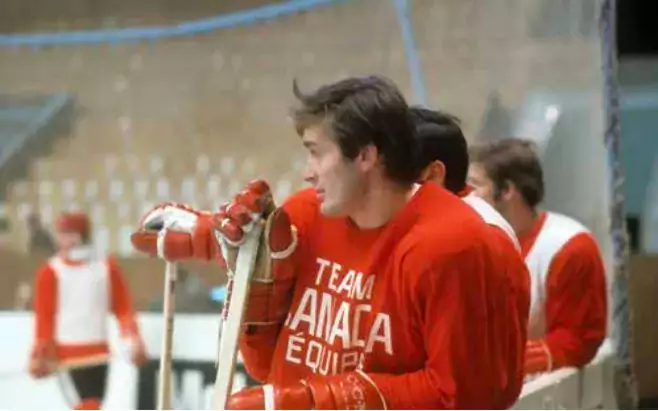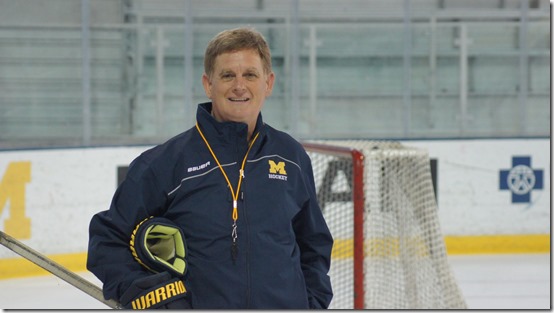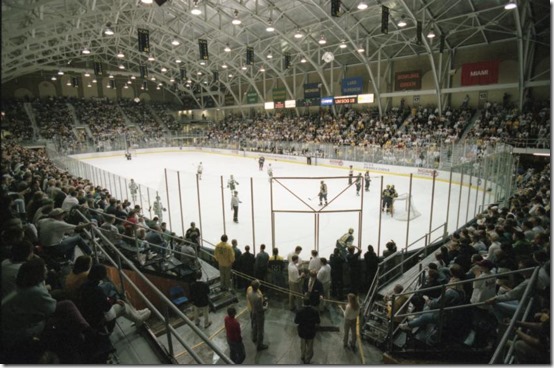red berenson

Ed- The following is an excerpt from John U. Bacon’s latest book, The Greatest Comeback, How Team Canada Fought Back, Took the Summit Series, and Reinvented Hockey.  If you’re familiar with the 1972 Summit Series, according to its principles and participants this is the best and most comprehensive accounting of that incredible sports moment of many written.
If you’re familiar with the 1972 Summit Series, according to its principles and participants this is the best and most comprehensive accounting of that incredible sports moment of many written.
If this is new to you, this book is the best introduction to one of the consequential moments in sports history, when East met West, when the hubris of liberal capitalism crashed into the cheap hypocrisy of totalitarian communism. It was the battle that inspired Rocky vs Drago, and introduced North America to the beautiful game played by the Soviets.
And all these guys talked. The executives, coaches, players, and superstars of the next generation who were inspired by what they saw all agreed to let Bacon craft the definitive version of one of the great sports stories of all time. Well, most of it—Mark Messier wrote the foreword. And in case the last sentence wasn’t a clue, this book is also, for my (U.S.) money, the most Canadian thing ever written.
------------------------------
In September of 1972 Team Canada opened the newly created Summit Series as one of the most heavily favored teams not merely in the history of hockey, but in the history of sports.
Just about every Canadian fan, journalist, player, and coach expected the greatest hockey team ever assembled to crush its untested opponents eight games to zero. Team Canada’s leaders were so certain of victory that they traded away every advantage the Soviets could conjure, including the referees. They’ve also invited 35 players, two full teams’ worth—including Red Berenson—to their training camp in Toronto, and promised all of them that they would get into at least one game. Anticipating little competition from the Soviets, they figured they could use the older players for the first four games in Canada, then let the younger players mop up the last four games in Moscow.
But that is not, of course, how it worked out.
As we join the story Team Canada is now down 1-2-1 in the eight-game series, needing to win three of four in Soviet Russia to avoid a nation-shattering collapse. Three of their teammates are flying home, angry. The 300 Canadian steaks and pallets of Labatt's they had sent over have disappeared, now circulating through Moscow’s black market. Their wives are suffering every indignity the communist officials can come up with. The press is calling them thugs. The commissioner of the NHL is calling them entitled. And 85 percent of their countrymen—more than saw the moon landing—are watching.
[After the jump: Coach Red is born]
[courtesy U-M Athletics]
It’s a cooler than usual Monday in September outside Yost Ice Arena, nature’s heavy-handed hint that hockey season is just weeks away. Inside, the new head coach’s office looks decidedly less new than it did a few weeks ago. The smell of leather fills the air—new chairs—albeit less so than in July. The built-in book cases have filled up with years of accolades and other snapshots from a life in hockey.
Framed photos line the upper shelves, but Mel Pearson doesn’t reach for those. Asked how he first got involved in hockey, he rises from his chair and plucks a photo from the top left corner of the furthest shelf to the left. It’s propped up in front of another picture, the lone unframed photo in the bunch. Pearson lays it down on his desk next to the neatly organized stacks of paper, presumably drills and practice plans and scouting reports that bear the emblems of teams from all over; one of the stacks is topped with a sheet that has the Pittsburgh Penguins’ logo in the top corner. “You’re just sort of born into it,” Pearson says, pointing to the back row of the photo. “This is Coach Berenson—this is an All-Star team up in Saskatchewan—and that’s my dad, so they actually had some history. It’s awesome. So they played together.”
It feels like a foundational event, a peek behind the curtain, the revelation of the moment that destiny staked its claim on a kid from Flin Flon, Manitoba. In reality, Pearson’s point is that the hockey world can be an awfully small place. George “Mel” Pearson’s son was about to criss-cross North America, a party to his father’s dream, soon to discover that sentiment was more true than he ever could have guessed.
[After THE JUMP: ties, timing, and the moment it all came together]
Previously: Part One, Part Two, Part Three
[West Regional vs NoDak, 1998/Kalmbach via Bentley Historical Library]
The story is almost too perfect. You expect the details of a hockey story to flow from odd angles, to be all jagged edges and shoulders and elbows and yet this story is writerly and neat and almost formulaic. It follows the kind of structure script writers teach in their intro film classes: the protagonist runs through the gauntlet and passes a test that changes them, then uses their newly girded spirit to pass the ultimate test and reap a reward barely fathomable at the start of the journey. From humble beginnings, etc.
The necessity of icing an unusually high number of freshmen dampened expectations at the start of Michigan’s 1997-98 season, but there were enough upperclassmen remaining—Marty Turco, Bill Muckalt, Matt Herr, and Bobby Hayes, to name a few—to keep them from falling off precipitously. Yes, skating four freshmen defensemen was different, but close games can be won with a Hobey Baker finalist, Muckalt, leading the offense and one of the best goaltenders in the country, Turco, as the last line of defense.
And close games—one-goal games, to be precise—soon became Michigan’s calling card. Entering the NCAA Tournament, sixteen of their 42 contests had been one-goal games, including two of the games that got them to the GLI final and two of the games that got them to the CCHA Tournament final. The GLI and CCHA finals against Michigan State and Ohio State, respectively, left their mark. Both were losses and both snapped long streaks for the Wolverines, who had won two straight CCHA tournaments and nine straight Great Lakes Invitationals.
Those losses, however, ended up helping Michigan in their NCAA Tournament seeding. Not only were they placed at the West Regional, which happened to be held at Yost this season, but they were seeded third. This put them on the opposite side of the bracket from Michigan State, the one-seed and no. 1 overall team in the nation, and Ohio State, the no. 6 team in the country yet somehow the four-seed. Two teams they’d had a problem with all year, their two in-conference archrivals, were on a collision course.
That didn’t mean that Michigan’s road to the Frozen Four would be easy, though. North Dakota, the defending national champion and no. 2 team in the USCHO poll, was waiting in the wings. Michigan would have to fight the temptation to look ahead to that game and first dispatch six-seed Princeton, which made the Tournament by winning the ECAC and was listed last in USCHO poll’s “others receiving votes” section.
-------------------------------
Mel Pearson, assistant coach: Weird game. It just seemed like we were either looking ahead or...there was something going on in that game and we just didn’t have it and there was nothing going right for us. I think part of that was Princeton but I don’t think we respected them enough as a team. They worked hard and they didn’t give us anything and I think we just thought we were going to come in and throw down our sticks and they were going to fade away and we’d blow them out and go into the regional final but it didn’t work out that way.
Innocent play from the sidewall down near the zamboni. I can’t even remember who threw it at the net but somehow it hit a couple guys in front and went right between the goalie’s legs. We didn’t even have a player in front of the net. I think it went off of one of their players and went in the net. Once that goal went in it just seemed like, Okay, here we go. The crowd got into it a little bit. Princeton had played an absolute great road game. They didn’t let the crowd into it for the most part but once that goal went in we started to play better.
The thing I remember is it was just a weird goal, literally. One of our guys backhanded it towards the net, it hits one of their guys, a defenseman, goes off a skate between the goalie’s net and it’s in. It’s like, there’s nobody there. It’s one of the weirdest goals I’ve ever seen. Did we have anybody in front? I don’t think there was. It’s strange. It’s just like an act of the hockey gods.
[After THE JUMP: The hockey gods have a field day]


25